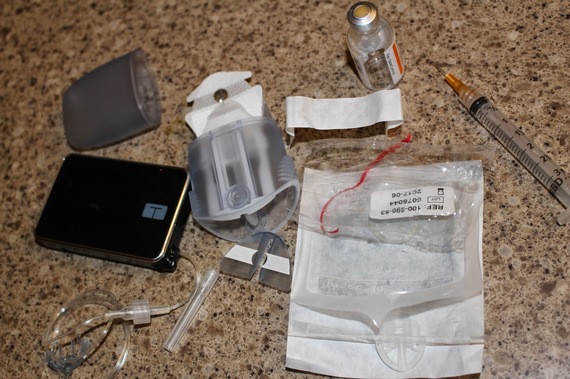Nine years ago, I was dying. I had been sick for a year and a half, and despite visiting five different medical professionals, I didn't have the answer to what was causing my mile-long list of symptoms. On a mild, March day, my husband took me to the emergency room because I was having trouble breathing, couldn't get enough to drink, and was uncomfortably cold.
An hour after I was examined and had multiple labs drawn, I had my answer. I had a forever-disease called Type 1 diabetes. Type 1 is an autoimmune condition where the body ceases to produce insulin, a life-sustaining hormone. I was in a state called Diabetic Ketoacidosis (DKA) where blood sugars are dangerously high and the body becomes a toxic mess. Left untreated, DKA can be a death sentence.
I spent five days in the hospital, learning to count carbohydrates in foods I consumed, dose and administer insulin, and check my blood sugar. I was also mourning the loss of the life I might have had without my disease. Additionally, I was deeply angry that my body's immune system had failed me.
During these days and the two weeks I spent recovering from my near-death experience, I had the most inconsiderate and frustrating things said to me. These left me further discouraged and upset.
1: "If anyone can handle this diagnosis, it's you!"
This is meant as a compliment, but what it does is put the newly-diagnosed person in the position to "suck it up" and "just deal" with what they are facing. A diagnosis is a loss. It's not something that can be swept away with self-control, willpower, or a can-do attitude. When we are diagnosed, it's not because we are stronger than any other person or are better equipped to face the situation.
2: "At least it's not ______."
When I was diagnosed nine years ago, a friend chirped, "At least it's not cancer!" Any diagnosis is serious and scary to the person facing the medical crisis. Do not attempt to minimize the seriousness of the situation by comparing it to another diagnosis that you deem more terrifying or gruesome. There is no such thing as a good diagnosis of a serious illness.
3: "God doesn't give us more than we can handle."
Easy to say when you aren't the person being told that, for example, without injecting insulin for the rest of your life, you will die. A diagnosis is incredibly overwhelming, depressing, and at times, debilitating. Yes, those diagnosis often find strength and wisdom as they progress on their journey, but this takes time, experience, and support. Also, please don't assume that we think God bestowed the diagnosis upon us as some sort of teachable moment or lifelong lesson.
4: "How are you feeling?" (Asked in a grave, low tone.)
First, do you really want to know how I'm feeling? Or are you just asking to be polite? Are you going to use the information to judge me, gossip about me, or advise me? If I do confide in you, keep the information to yourself. I want to feel like a human being, not a talking point in conversations that take place behind my back. If you choose to ask how I'm feeling, be prepared to listen and be supportive. Do not offer me medical or coping advice.
5: "Get well soon!"
Many diagnoses are forever. There is no "getting well." And even if a person is diagnosed with something that goes into remission, the experience is never, ever forgotten. It shapes us, changes us, and leaves a lasting impression on our hearts and minds. Instead of telling us to "get well," as if it's a matter of will or choice, do something nice for us, unsolicited, that will bring us comfort and joy. Bring us our favorite coffee drink, send us a funny card, or offer to do something that is taxing for us at that time (mow the lawn, clean the house, pick up the kids from school).
Please remember the newly-diagnosed are people, first and foremost, not patients, victims, or God's chess pieces. When you are uncertain what to say, it's best to be honest. "Wow, what you are facing seems really difficult. What are some practical ways I can help you right now?" Your grace and honesty will be greatly appreciated during our moment of desperation, grief, and uncertainty.
